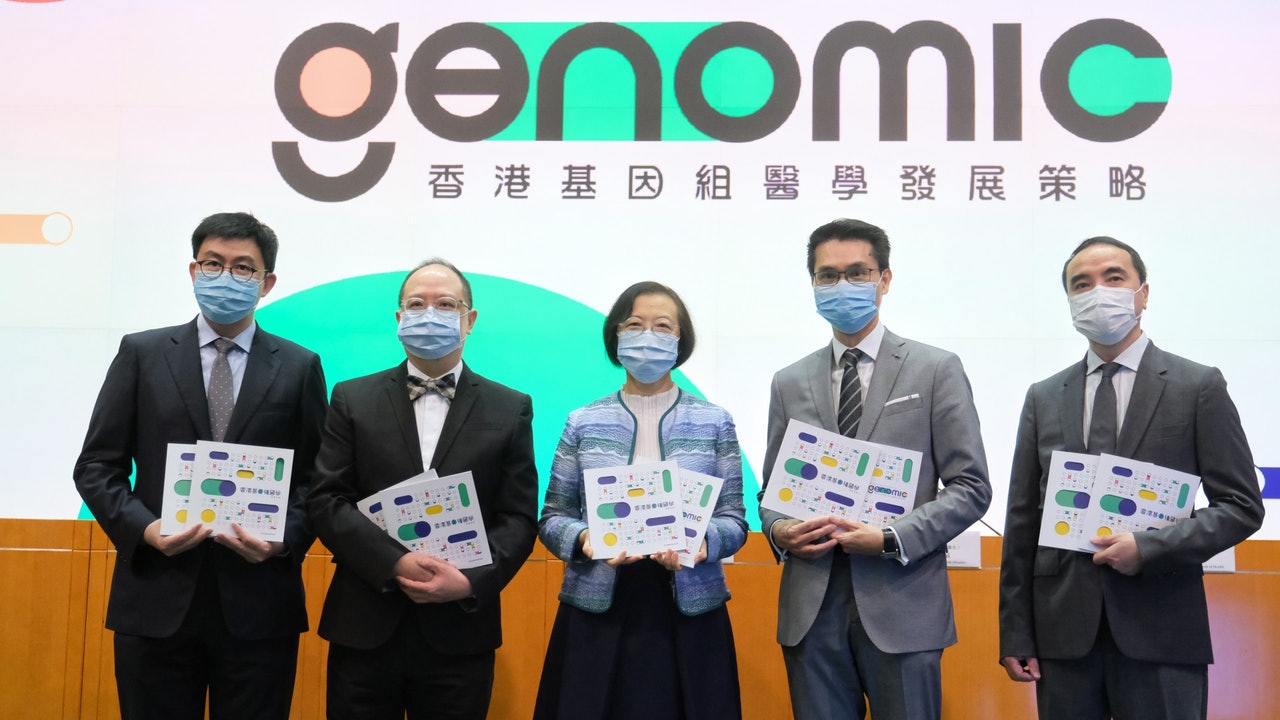Social News
Author: Li Enci
2020-05-14 18:44
Last update date: 2020-05-14 18:44Only 10% of the rare diseases in Hong Kong can be diagnosed and there are about 800 patients of unknown etiology every year. The government set up a genomic medicine steering committee earlier, hoping to use new technologies to improve public health policies. The committee today (14th) published the first "Hong Kong Genomic Medicine Development Strategy", which made eight recommendations. The Secretary for Food and Health Chen Zhaoshi said that the government has set aside $ 1.2 billion to implement the Hong Kong Genome Project in the next six years. A total of 20,000 cases will be tested for genomic sequence, including undiagnosed diseases and possible genetic related cancer.
The government recently established the Hong Kong Genomics Center. It will begin recruitment immediately and begin preliminary preparations before the end of the year. It is expected that the recruitment of patients will begin in the middle of next year.
The committee today (14th) published the first "Hong Kong Genomic Medicine Development Strategy", which made eight recommendations. (Photo by Luo Junhao)
Lu Huiwen, a consultant doctor in the Department of Genetics of the Department of Health, said that the Department of Health receives 400 to 500 undiagnosable cases each year. It is estimated that there are 700 to 800 related patients in Hong Kong every year.
2000 cases detected in the next year and a half
The Secretary for Food and Health Chen Zhaoshi said that the government has set aside 1.2 billion yuan to implement the Hong Kong genome project within six years. Fang Yi, deputy secretary-general of the Food and Health Bureau (Hygiene), said that he planned to complete the pilot phase within a year and a half, testing for 2,000 cases including undiagnosed conditions and cancers that may be related to genetics Review. The subsequent main phase will sort out 18,000 cases and expand to other applicable diseases and research groups. In total, about 50,000 genome sequencings are planned, involving 20,000 cases. Fang also said that at present, Hong Kong can only diagnose about 10% of rare diseases, and hopes to increase the diagnosis rate to 30% to 40% through the plan.
The Government established the Hong Kong Genome Center in May this year to implement the above-mentioned Hong Kong Genome Project. The center will immediately start recruiting employees and carry out preliminary preparations before the end of the year. It is expected that the recruitment of patients will begin in the middle of next year. The center has three partner centers responsible for clinical work, including Hong Kong Children ’s Hospital, Queen Mary Hospital and Prince of Wales Hospital.
Fang Yi emphasized that the genome project is voluntary and patients can withdraw at any time without giving reasons. Named data can only be viewed by clinical staff, and researchers cannot identify the patient ’s identity to ensure that the data is used appropriately.
The Secretary for Food and Health Chen Zhaoshi said that the government has set aside 1.2 billion yuan to implement the Hong Kong genome project within six years. (Photo by Luo Junhao)
Genome center needs to recruit 60 to 100 people
Fang Yi said frankly that there is a shortage of scientific talents, especially genomics talents in Hong Kong. The Genomics Centre is expected to need 60 to 100 people, and local and overseas recruitment must be carried out. He said that the government will cooperate with universities and professional institutions to establish a local talent pool of genetics and genomic medicine. The Hospital Authority and the Department of Health will set up special positions such as clinical genetics doctors and genetic counselors. The center will also help plan appropriate courses to provide medical professionals with more training and education on the cause group.
Liang Xiansun, chairman of the Genomic Medicine Steering Committee, said that genomic medicine is very important for studying genetic diseases, degenerative diseases, and even new coronaviruses. (Photo by Luo Junhao)
In the long run, Chen Zhaoshi hopes that Hong Kong can establish a large-scale health database to support research on diseases specific to the local population and apply it to clinical management and research.
She also said that she hopes that through strengthening public education, people will know more about the benefits and limitations of genomic medicine. The committee recommended strengthening the laboratory network, collaborating with universities, and compiling a roster to recognize more genetic and genomic testing.
Citizens who buy insurance do not need to submit a sequencing report
Member of the Genomic Medicine Steering Committee Ou Chengcheng said that the committee will strengthen the regulation of the use of genetic data for protection and employment purposes, and believes that the insurance guidelines retain flexibility and are beneficial to the industry and the market. He pointed out that the general public does not need to submit a gene sequencing report when applying for insurance, and most of the insurance in the future, including all voluntary medical insurance plans, cannot force policyholders to submit genetic data. However, some high-end insurance schemes can be exempted, including life and critical illness insurance with sums in excess of one million yuan.
Chen Zhaoshi said that everyone's genes are unique. Understanding genes can help people know why they are more susceptible to a certain disease, and also help the medical community to study treatment options. The Government fully accepts the recommendations of the Steering Committee and will assist in the implementation of the recommendations.
Liang Xiansun, chairman of the Genomic Medicine Steering Committee, said that genomic medicine is very important for studying genetic diseases, degenerative diseases, and even new coronaviruses. Different people contract the same acquired disease, and the condition is also different. The reason behind it may be related to the combination of genes. He was happy about the report.
[Wuhan Pneumonia] Experts analyzed that 2019-nCov is related to SARS gene but is a different virus?
[Wuhan Pneumonia] The Center for Health Protection will develop tests for the new coronavirus gene sequencing
[Wuhan Pneumonia] New virus and Zhejiang bat genes are most likely to be negative in all suspected cases in Hong Kong
Gene Technology Food and Health Bureau Rare Diseases



/cloudfront-eu-central-1.images.arcpublishing.com/prisa/ZV3HRONFCNGOLA37LDSKYTU2VY.jpg)

